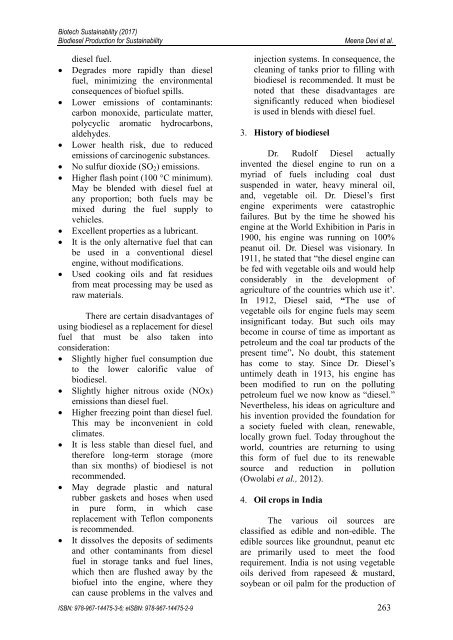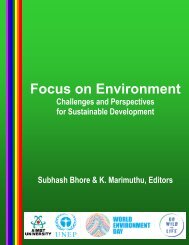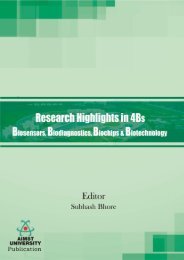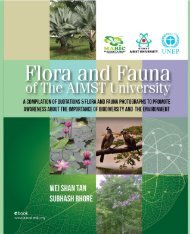- Page 1 and 2:
Biotechnology for Sustainability Ac
- Page 3 and 4:
Biotechnology for Sustainability Ac
- Page 5 and 6:
Dedication This book is dedicated t
- Page 7 and 8:
Contents Preface ..................
- Page 9 and 10:
Biotechnology as a Tool for Conserv
- Page 11 and 12:
Biotechnology for Sustainability Ac
- Page 13 and 14:
Biotech Sustainability (2017) Plant
- Page 15 and 16:
Biotech Sustainability (2017) Plant
- Page 17 and 18:
Biotech Sustainability (2017) Plant
- Page 19 and 20:
Biotech Sustainability (2017) Plant
- Page 21 and 22:
Biotech Sustainability (2017) Plant
- Page 23 and 24:
Biotech Sustainability (2017) Plant
- Page 25 and 26:
Biotech Sustainability (2017) Tradi
- Page 27 and 28:
Biotech Sustainability (2017) Tradi
- Page 29 and 30:
Biotech Sustainability (2017) Tradi
- Page 31 and 32:
Biotech Sustainability (2017) Tradi
- Page 33 and 34:
Biotech Sustainability (2017) Tradi
- Page 35 and 36:
Biotech Sustainability (2017) Tradi
- Page 37 and 38:
Biotech Sustainability (2017) Tradi
- Page 39 and 40:
Biotech Sustainability (2017) Tradi
- Page 41 and 42:
Biotech Sustainability (2017) Tradi
- Page 43 and 44:
Biotech Sustainability (2017) Tradi
- Page 45 and 46:
Biotech Sustainability (2017) Tradi
- Page 47 and 48:
Biotech Sustainability (2017) Tradi
- Page 49 and 50:
Biotech Sustainability (2017) Tradi
- Page 51 and 52:
Biotechnology for Sustainability Ac
- Page 53 and 54:
Biotech Sustainability (2017) Vermi
- Page 55 and 56:
Biotech Sustainability (2017) Vermi
- Page 57 and 58:
Biotech Sustainability (2017) Vermi
- Page 59 and 60:
Biotech Sustainability (2017) Vermi
- Page 61 and 62:
Biotechnology for Sustainability Ac
- Page 63 and 64:
Biotech Sustainability (2017) Role
- Page 65 and 66:
Biotech Sustainability (2017) Role
- Page 67 and 68:
Biotech Sustainability (2017) Role
- Page 69 and 70:
Biotech Sustainability (2017) Manag
- Page 71 and 72:
Biotech Sustainability (2017) Manag
- Page 73 and 74:
Biotech Sustainability (2017) Manag
- Page 75 and 76:
Biotech Sustainability (2017) Manag
- Page 77 and 78:
Biotech Sustainability (2017) Manag
- Page 79 and 80:
Biotech Sustainability (2017) Desig
- Page 81 and 82:
Biotech Sustainability (2017) Desig
- Page 83 and 84:
Biotech Sustainability (2017) Desig
- Page 85 and 86:
Biotech Sustainability (2017) Desig
- Page 87 and 88:
Biotech Sustainability (2017) Desig
- Page 89 and 90:
Biotechnology for Sustainability Ac
- Page 91 and 92:
Biotech Sustainability (2017) Clona
- Page 93 and 94:
Biotech Sustainability (2017) Clona
- Page 95 and 96:
Biotech Sustainability (2017) Clona
- Page 97 and 98:
Biotech Sustainability (2017) Clona
- Page 99 and 100:
Biotech Sustainability (2017) Spent
- Page 101 and 102:
Biotech Sustainability (2017) Spent
- Page 103 and 104:
Biotech Sustainability (2017) Spent
- Page 105 and 106:
Biotech Sustainability (2017) Spent
- Page 107 and 108:
Biotech Sustainability (2017) Spent
- Page 109 and 110:
Biotech Sustainability (2017) Spent
- Page 111 and 112:
Biotech Sustainability (2017) Spent
- Page 113 and 114:
Biotech Sustainability (2017) Spent
- Page 115 and 116:
Biotech Sustainability (2017) Biote
- Page 117 and 118:
Biotech Sustainability (2017) Biote
- Page 119 and 120:
Biotech Sustainability (2017) Biote
- Page 121 and 122:
Biotech Sustainability (2017) Biote
- Page 123 and 124:
Biotech Sustainability (2017) Biote
- Page 125 and 126:
Biotech Sustainability (2017) Biote
- Page 127 and 128:
Biotechnology for Sustainability Ac
- Page 129 and 130:
Biotech Sustainability (2017) Biote
- Page 131 and 132:
Biotech Sustainability (2017) Biote
- Page 133 and 134:
Biotech Sustainability (2017) Biote
- Page 135 and 136:
Biotech Sustainability (2017) Biote
- Page 137 and 138:
Biotech Sustainability (2017) Biote
- Page 139 and 140:
Biotechnology for Sustainability Ac
- Page 141 and 142:
Biotech Sustainability (2017) Oppor
- Page 143 and 144:
Biotech Sustainability (2017) Oppor
- Page 145 and 146:
Biotech Sustainability (2017) Oppor
- Page 147 and 148:
Biotech Sustainability (2017) Oppor
- Page 149 and 150:
Biotech Sustainability (2017) Oppor
- Page 151 and 152:
Biotechnology for Sustainability Ac
- Page 153 and 154:
Biotech Sustainability (2017) Natur
- Page 155 and 156:
Biotech Sustainability (2017) Natur
- Page 157 and 158:
Biotech Sustainability (2017) Natur
- Page 159 and 160:
Biotech Sustainability (2017) Natur
- Page 161 and 162:
Biotech Sustainability (2017) Natur
- Page 163 and 164:
Biotech Sustainability (2017) Natur
- Page 165 and 166:
Biotech Sustainability (2017) Natur
- Page 167 and 168:
Biotech Sustainability (2017) Natur
- Page 169 and 170:
Biotech Sustainability (2017) Natur
- Page 171 and 172:
Biotech Sustainability (2017) Natur
- Page 173 and 174:
Biotech Sustainability (2017) Natur
- Page 175 and 176:
Biotech Sustainability (2017) Natur
- Page 177 and 178:
Biotech Sustainability (2017) Natur
- Page 179 and 180:
Biotech Sustainability (2017) Natur
- Page 181 and 182:
Biotechnology for Sustainability Ac
- Page 183 and 184:
Biotech Sustainability (2017) A Rev
- Page 185 and 186:
Biotech Sustainability (2017) A Rev
- Page 187 and 188:
Biotech Sustainability (2017) A Rev
- Page 189 and 190:
Biotech Sustainability (2017) A Rev
- Page 191 and 192:
Biotech Sustainability (2017) A Rev
- Page 193 and 194:
Biotech Sustainability (2017) A Rev
- Page 195 and 196:
Biotech Sustainability (2017) A Rev
- Page 197 and 198:
Biotechnology for Sustainability Ac
- Page 199 and 200:
Biotech Sustainability (2017) Produ
- Page 201 and 202:
Biotech Sustainability (2017) Produ
- Page 203 and 204:
Biotech Sustainability (2017) Produ
- Page 205 and 206:
Biotech Sustainability (2017) Produ
- Page 207 and 208:
Biotech Sustainability (2017) Produ
- Page 209 and 210:
Biotech Sustainability (2017) Produ
- Page 211 and 212:
Biotech Sustainability (2017) Poten
- Page 213 and 214:
Biotech Sustainability (2017) Poten
- Page 215 and 216:
Biotech Sustainability (2017) Poten
- Page 217 and 218:
Biotech Sustainability (2017) Poten
- Page 219 and 220:
Biotech Sustainability (2017) Poten
- Page 221 and 222: Biotech Sustainability (2017) Poten
- Page 223 and 224: Biotech Sustainability (2017) Conve
- Page 225 and 226: Biotech Sustainability (2017) Conve
- Page 227 and 228: Biotech Sustainability (2017) Conve
- Page 229 and 230: Biotech Sustainability (2017) Conve
- Page 231 and 232: Biotech Sustainability (2017) Conve
- Page 233 and 234: Biotechnology for Sustainability Ac
- Page 235 and 236: Biotech Sustainability (2017) Bacte
- Page 237 and 238: Biotech Sustainability (2017) Bacte
- Page 239 and 240: Biotech Sustainability (2017) Bacte
- Page 241 and 242: Biotech Sustainability (2017) Bacte
- Page 243 and 244: Biotech Sustainability (2017) Bacte
- Page 245 and 246: Biotech Sustainability (2017) Bacte
- Page 247 and 248: Biotech Sustainability (2017) Bacte
- Page 249 and 250: Biotech Sustainability (2017) Bacte
- Page 251 and 252: Biotech Sustainability (2017) Bacte
- Page 253 and 254: Biotech Sustainability (2017) Bacte
- Page 255 and 256: Biotech Sustainability (2017) Bacte
- Page 257 and 258: Biotech Sustainability (2017) Bacte
- Page 259 and 260: Biotech Sustainability (2017) Micro
- Page 261 and 262: Biotech Sustainability (2017) Micro
- Page 263 and 264: Biotech Sustainability (2017) Micro
- Page 265 and 266: Biotech Sustainability (2017) Micro
- Page 267 and 268: Biotech Sustainability (2017) Micro
- Page 269 and 270: Biotech Sustainability (2017) Micro
- Page 271: Biotech Sustainability (2017) Micro
- Page 275 and 276: Biotech Sustainability (2017) Biodi
- Page 277 and 278: Biotech Sustainability (2017) Biodi
- Page 279 and 280: Biotech Sustainability (2017) Biodi
- Page 281 and 282: Biotech Sustainability (2017) Biodi
- Page 283 and 284: Biotech Sustainability (2017) Biodi
- Page 285 and 286: Biotech Sustainability (2017) In vi
- Page 287 and 288: Biotech Sustainability (2017) In vi
- Page 289 and 290: Biotech Sustainability (2017) In vi
- Page 291 and 292: Biotech Sustainability (2017) In vi
- Page 293 and 294: Biotech Sustainability (2017) In vi
- Page 295 and 296: Biotech Sustainability (2017) In vi
- Page 297 and 298: Biotechnology for Sustainability Ac
- Page 299 and 300: Biotech Sustainability (2017) Lipop
- Page 301 and 302: Biotech Sustainability (2017) Lipop
- Page 303 and 304: Biotech Sustainability (2017) Lipop
- Page 305 and 306: Biotechnology for Sustainability Ac
- Page 307 and 308: Biotech Sustainability (2017) Genet
- Page 309 and 310: Biotech Sustainability (2017) Genet
- Page 311 and 312: Biotech Sustainability (2017) Genet
- Page 313 and 314: Biotech Sustainability (2017) Genet
- Page 315 and 316: Biotechnology for Sustainability Ac
- Page 317 and 318: Biotech Sustainability (2017) Plant
- Page 319 and 320: Biotech Sustainability (2017) Plant
- Page 321 and 322: Biotech Sustainability (2017) Plant
- Page 323 and 324:
Biotech Sustainability (2017) Plant
- Page 325 and 326:
Biotech Sustainability (2017) Plant
- Page 327 and 328:
Biotech Sustainability (2017) Plant
- Page 329 and 330:
Biotech Sustainability (2017) Plant
- Page 331 and 332:
Biotech Sustainability (2017) Plant
- Page 333 and 334:
Biotech Sustainability (2017) Renew
- Page 335 and 336:
Biotech Sustainability (2017) Renew
- Page 337 and 338:
Biotech Sustainability (2017) Renew
- Page 339 and 340:
Biotech Sustainability (2017) Renew
- Page 341 and 342:
Biotech Sustainability (2017) Renew
- Page 343 and 344:
Biotech Sustainability (2017) Renew
- Page 345 and 346:
Biotech Sustainability (2017) Renew
- Page 347 and 348:
Biotech Sustainability (2017) Mitig
- Page 349 and 350:
Biotech Sustainability (2017) Mitig
- Page 351 and 352:
Biotech Sustainability (2017) Mitig
- Page 353 and 354:
Biotech Sustainability (2017) Mitig
- Page 355 and 356:
Biotech Sustainability (2017) Sensi
- Page 357 and 358:
Biotech Sustainability (2017) Sensi
- Page 359 and 360:
Biotech Sustainability (2017) Sensi
- Page 361 and 362:
Biotech Sustainability (2017) Sensi
- Page 363 and 364:
Biotech Sustainability (2017) Sensi
- Page 365 and 366:
Biotech Sustainability (2017) Sensi
- Page 367 and 368:
Biotech Sustainability (2017) Sensi
- Page 369 and 370:
Biotech Sustainability (2017) Promi
- Page 371 and 372:
Biotech Sustainability (2017) Promi
- Page 373 and 374:
Biotech Sustainability (2017) Promi
- Page 375 and 376:
Biotech Sustainability (2017) Promi
- Page 377 and 378:
Biotech Sustainability (2017) Promi
- Page 379 and 380:
Biotech Sustainability (2017) Promi
- Page 381 and 382:
Biotech Sustainability (2017) Promi
- Page 383 and 384:
Biotech Sustainability (2017) Promi
- Page 385 and 386:
Biotech Sustainability (2017) Promi
- Page 387 and 388:
Biotech Sustainability (2017) Organ
- Page 389 and 390:
Biotech Sustainability (2017) Organ
- Page 391 and 392:
Biotech Sustainability (2017) Organ
- Page 393 and 394:
Biotech Sustainability (2017) Organ
- Page 395 and 396:
Biotech Sustainability (2017) Organ
- Page 397 and 398:
Biotech Sustainability (2017) Biote
- Page 399 and 400:
Biotech Sustainability (2017) Biote
- Page 401 and 402:
Biotech Sustainability (2017) Biote
- Page 403 and 404:
Biotech Sustainability (2017) Biote
- Page 405 and 406:
Biotech Sustainability (2017) Biote
- Page 407 and 408:
Biotech Sustainability (2017) Biote
- Page 409 and 410:
Biotech Sustainability (2017) Biore
- Page 411 and 412:
Biotech Sustainability (2017) Biore
- Page 413 and 414:
Biotech Sustainability (2017) Biore
- Page 415 and 416:
Biotech Sustainability (2017) Biore
- Page 417 and 418:
Biotech Sustainability (2017) Biore
- Page 419 and 420:
Biotech Sustainability (2017) Biore
- Page 421 and 422:
Biotech Sustainability (2017) Biore
- Page 423 and 424:
Biotech Sustainability (2017) Biore
- Page 425 and 426:
Biotech Sustainability (2017) Biore
- Page 427 and 428:
Biotechnology for Sustainability Ac
- Page 429 and 430:
Biotech Sustainability (2017) Sea U
- Page 431 and 432:
Biotech Sustainability (2017) Sea U
- Page 433 and 434:
Biotech Sustainability (2017) Sea U
- Page 435 and 436:
Biotech Sustainability (2017) Sea U
- Page 437 and 438:
Biotech Sustainability (2017) Sea U
- Page 439 and 440:
Biotech Sustainability (2017) Sea U
- Page 441 and 442:
Biotech Sustainability (2017) Sea U
- Page 443 and 444:
Biotech Sustainability (2017) Sea U
- Page 445 and 446:
Biotech Sustainability (2017) Sea U
- Page 447 and 448:
Biotech Sustainability (2017) Sea U
- Page 449 and 450:
Biotech Sustainability (2017) Sea U
- Page 451 and 452:
Biotech Sustainability (2017) Sea U
- Page 453 and 454:
Biotech Sustainability (2017) Sea U
- Page 455 and 456:
Biotech Sustainability (2017) Marin
- Page 457 and 458:
Biotech Sustainability (2017) Marin
- Page 459 and 460:
Biotech Sustainability (2017) Marin
- Page 461 and 462:
Biotech Sustainability (2017) Marin
- Page 463 and 464:
Biotech Sustainability (2017) Marin
- Page 465 and 466:
Biotech Sustainability (2017) Marin
- Page 467 and 468:
Biotech Sustainability (2017) Ecolo
- Page 469 and 470:
Biotech Sustainability (2017) Ecolo
- Page 471 and 472:
Biotech Sustainability (2017) Ecolo
- Page 473 and 474:
Biotech Sustainability (2017) Ecolo
- Page 475 and 476:
Biotech Sustainability (2017) Ecolo
- Page 477 and 478:
Biotech Sustainability (2017) Ecolo
- Page 479 and 480:
Biotech Sustainability (2017) Ecolo
- Page 481 and 482:
Biotech Sustainability (2017) Ecolo
- Page 483 and 484:
Biotech Sustainability (2017) Ecolo
- Page 485 and 486:
Biotechnology for Sustainability Ac
- Page 487 and 488:
Biotech Sustainability (2017) Synth
- Page 489 and 490:
Biotech Sustainability (2017) Synth
- Page 491 and 492:
Biotech Sustainability (2017) Synth
- Page 493 and 494:
Biotech Sustainability (2017) Synth
- Page 495 and 496:
Biotech Sustainability (2017) Synth
- Page 497 and 498:
Biotech Sustainability (2017) Diver
- Page 499 and 500:
Biotech Sustainability (2017) Diver
- Page 501 and 502:
Biotech Sustainability (2017) Diver
- Page 503 and 504:
Biotech Sustainability (2017) Diver
- Page 505 and 506:
Biotech Sustainability (2017) Diver
- Page 507 and 508:
Biotech Sustainability (2017) Diver
- Page 509 and 510:
Biotech Sustainability (2017) Diver
- Page 511 and 512:
Biotech Sustainability (2017) Diver
- Page 513 and 514:
Biotech Sustainability (2017) Diver
- Page 515 and 516:
Biotech Sustainability (2017) Diver
- Page 517 and 518:
Biotech Sustainability (2017) Diver
- Page 519 and 520:
Biotech Sustainability (2017) Diver
- Page 521 and 522:
Biotech Sustainability (2017) Diver
- Page 523 and 524:
Biotech Sustainability (2017) Free
- Page 525 and 526:
Biotech Sustainability (2017) Free
- Page 527 and 528:
Biotech Sustainability (2017) Free
- Page 529 and 530:
Biotech Sustainability (2017) Free
- Page 531 and 532:
Biotech Sustainability (2017) Free
- Page 533 and 534:
Biotech Sustainability (2017) Free
- Page 535 and 536:
Biotechnology for Sustainability Ac
- Page 537 and 538:
Biotech Sustainability (2017) Use O
- Page 539 and 540:
Biotech Sustainability (2017) Use O
- Page 541 and 542:
Biotech Sustainability (2017) Use O
- Page 543 and 544:
Biotech Sustainability (2017) Use O
- Page 545 and 546:
Biotech Sustainability (2017) Incre
- Page 547 and 548:
Biotech Sustainability (2017) Incre
- Page 549 and 550:
“Earth provides enough to satisfy
- Page 551 and 552:
simple cold chain free molecular di







